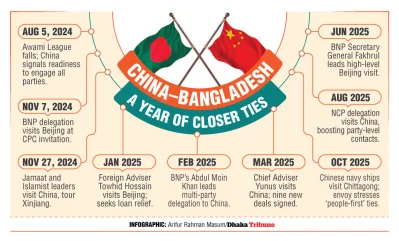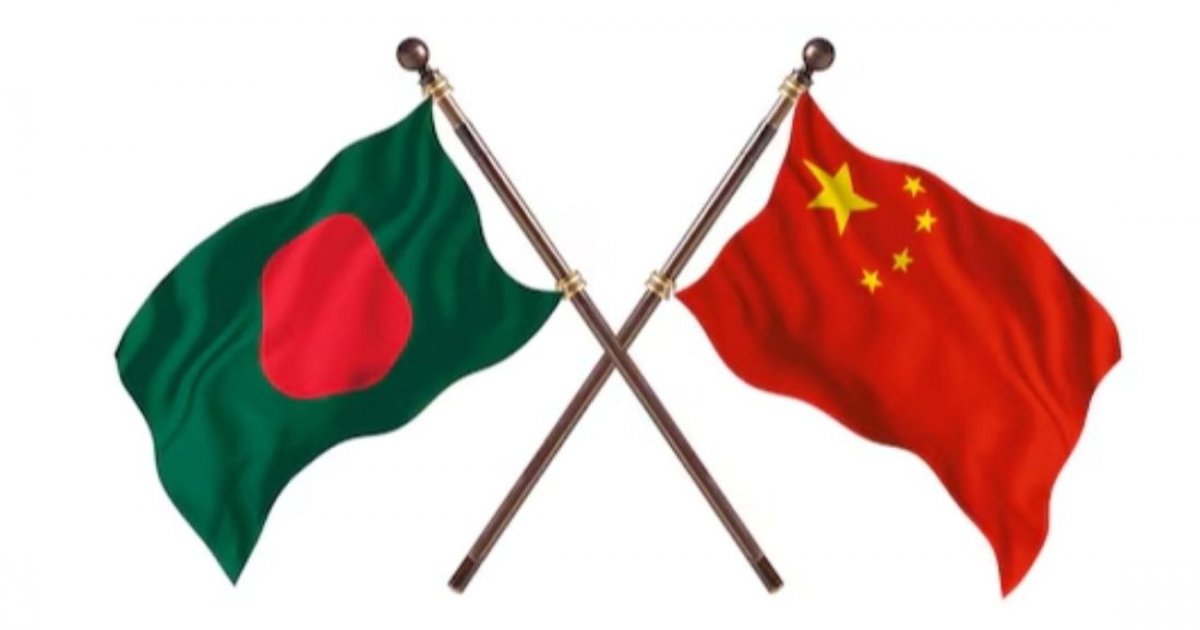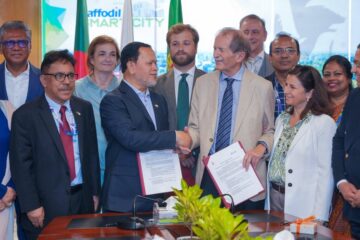Since the fall of the Awami League government on August 5 last year, Bangladesh’s regional diplomacy has undergone a striking realignment.
As ties with India cooled following the student-led uprising that ended Sheikh Hasina’s long rule, Beijing has moved swiftly to strengthen its position – deepening political, economic, and cultural links with the new interim administration and a range of political parties.
Once viewed mainly as a trade partner, China has now emerged as a more visible player across education, healthcare, and cultural exchange.
Easier visa access and frequent official visits have symbolized this new phase in Dhaka–Beijing relations.
A surge in political exchanges
In the months after the transition, China intensified outreach to almost all major political blocs in Bangladesh.
The Communist Party of China first invited a four-member BNP delegation to Beijing on November 7 last year, restarting high-level contact that had been dormant for years.
Weeks later, Jamaat-e-Islami and several Islamist party leaders, led by Dr Syed Abdullah Mohammad Taher, made their first-ever official trip to China.
They visited the Xinjiang Uyghur Autonomous Region, signaling Beijing’s intent to engage Bangladesh’s Islamic political spectrum as part of its broader regional diplomacy.
Before that visit, Chinese Ambassador Yao Wen hosted a reception, calling Bangladesh “a country at a historic juncture” and emphasizing Beijing’s desire to cooperate with all parties and the interim authorities.
“This is a new beginning to strengthen the China-Bangladesh comprehensive strategic partnership,” he said.
In February, BNP Standing Committee member Dr Abdul Moin Khan led a 22-member “Bangladesh-China Friendship” delegation that included politicians, academics, and journalists.
BNP Secretary General Mirza Fakhrul Islam Alamgir followed in June, and an eight-member National Citizen Party (NCP) team visited in August.
Two journalist groups also toured Chinese provinces under government invitation, exploring hospitals, biotech firms, and infrastructure projects as part of the 50th anniversary of bilateral ties.
Cultural diplomacy has accompanied this political wave.
The Chinese Embassy has organized drone shows at national events and trained 11 Bangladeshis in drone operations.
In October 2024, Chinese navy ships Chi Jiguang and Jing Gangshan paid a goodwill visit to Chittagong Port.
High-level engagement
Foreign Affairs Adviser Towhid Hossain made the interim government’s first official foreign trip to Beijing in January, meeting Chinese Foreign Minister Wang Yi.
Dhaka requested loan rescheduling and lower interest rates, which Beijing agreed to consider.
Two months later, Chief Adviser Professor Muhammad Yunus made a state visit to China aboard a chartered flight sent by Beijing.
The two governments signed nine agreements and memoranda covering infrastructure, health, and trade.

Key pledges included modernizing Mongla Port, creating a Chinese-assisted special economic zone, and building a robotic physiotherapy and rehabilitation center in Bangladesh.
In the joint statement, Dhaka reaffirmed its commitment to the “One China Policy” and its opposition to “Taiwan independence.”
The statement declared the People’s Republic of China as “the only legitimate government representing all of China” – a stance seen by analysts as Dhaka’s clearest tilt toward Beijing in decades.
‘China fills India’s void’
Diplomatic observers say Beijing is capitalizing on the space created by the cooling of Dhaka–Delhi ties.
“China has always maintained cordial relations with Bangladesh, but India’s dominance limited its outreach,” said a former ambassador.
“After the August transition, Beijing seized the opportunity to broaden its influence.”
Within the first year of the interim government, nearly every major political party has sent delegations to China, an unprecedented show of engagement that signals Beijing’s strategy of cultivating all political fronts rather than betting on one.
Beyond politics, China has eased visa rules for Bangladeshi businesspeople, medical travelers, and tourists, introducing an online “green channel” for faster processing. Participation by Bangladeshi entrepreneurs in events such as the Canton Fair has surged.
Speaking at a seminar in Dhaka on October 29, Ambassador Yao Wen framed the growing ties as “for the benefit of the people.”
“From Professor Muhammad Yunus to leaders of BNP, Jamaat, and NCP – everyone visiting China reflects the strength of our friendship,” he said.
Analysts describe Beijing’s approach as a comprehensive charm offensive combining infrastructure, education, and cultural exchange to secure its long-term influence.
For Dhaka, the challenge lies in leveraging this partnership while maintaining strategic balance in South Asia.
“China is moving fast to fill the diplomatic space left open,” said a senior diplomat.
“Whether Bangladesh can turn that into an advantage, or dependence, will define its foreign policy in the years to come.”



